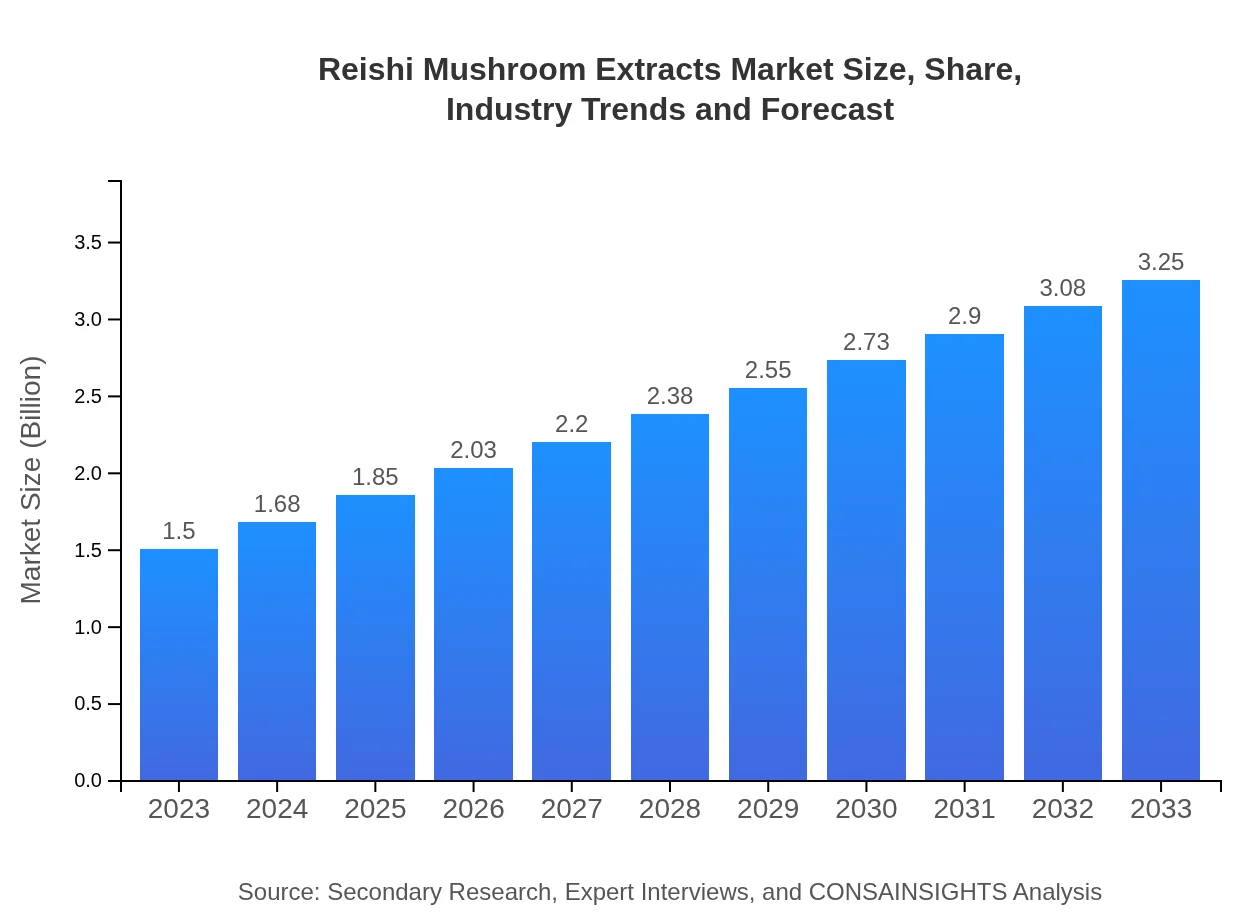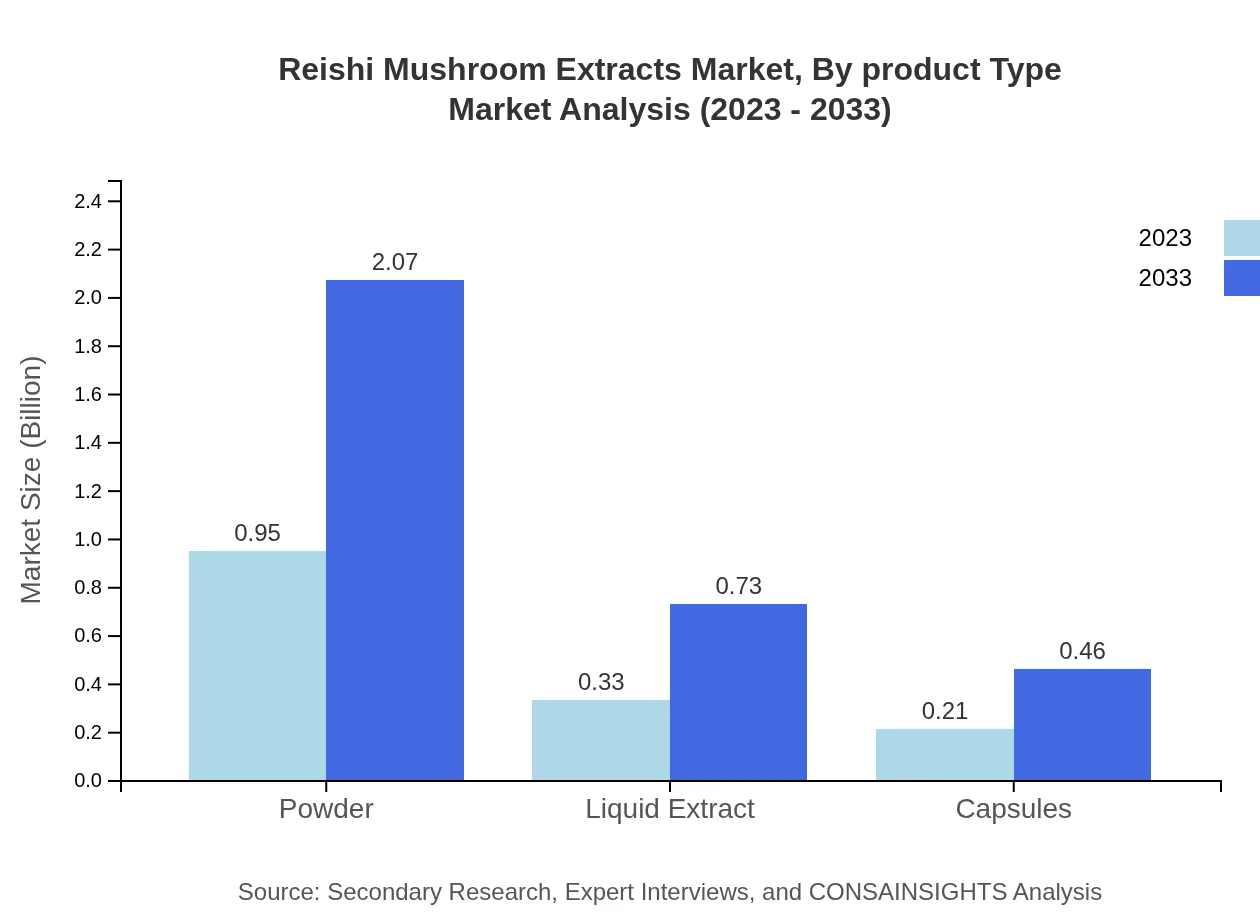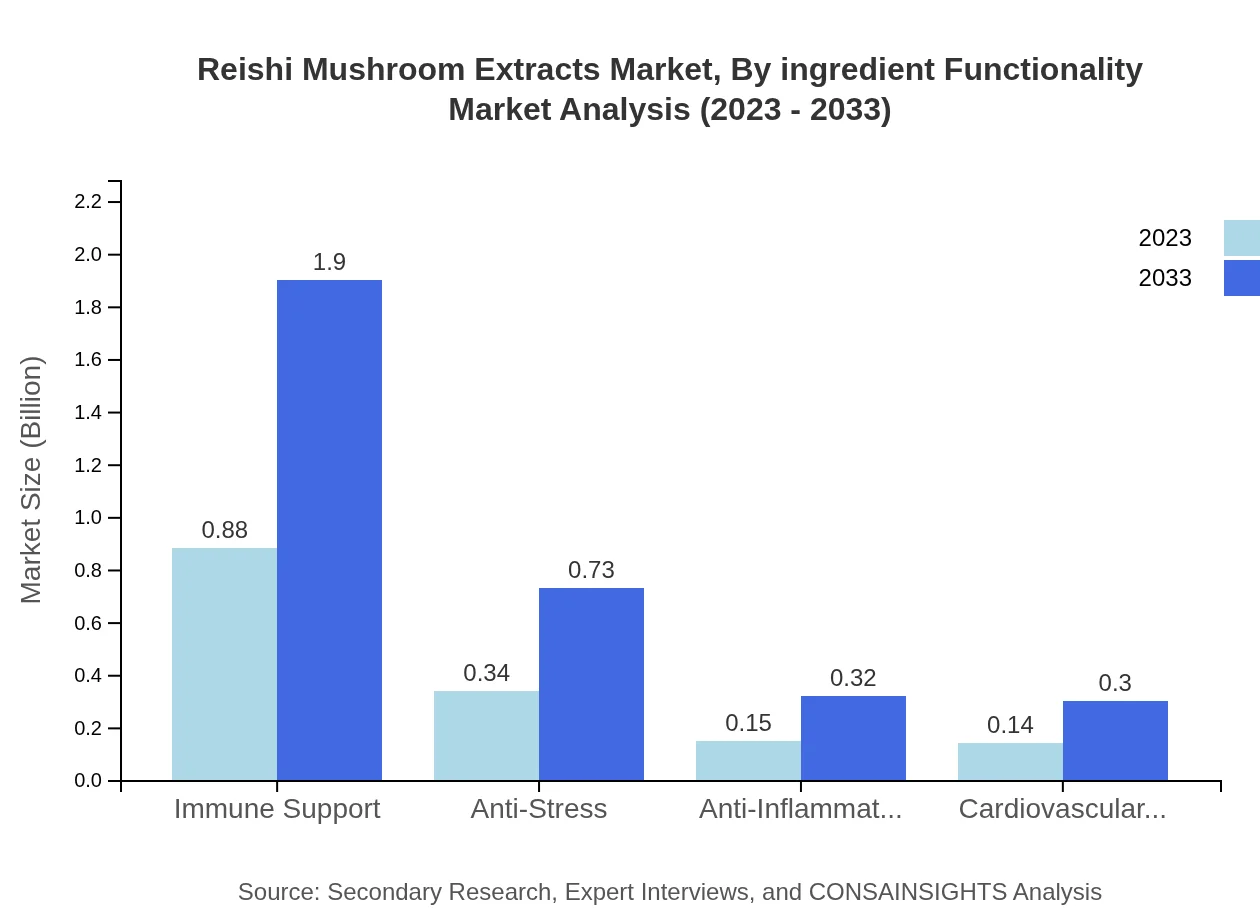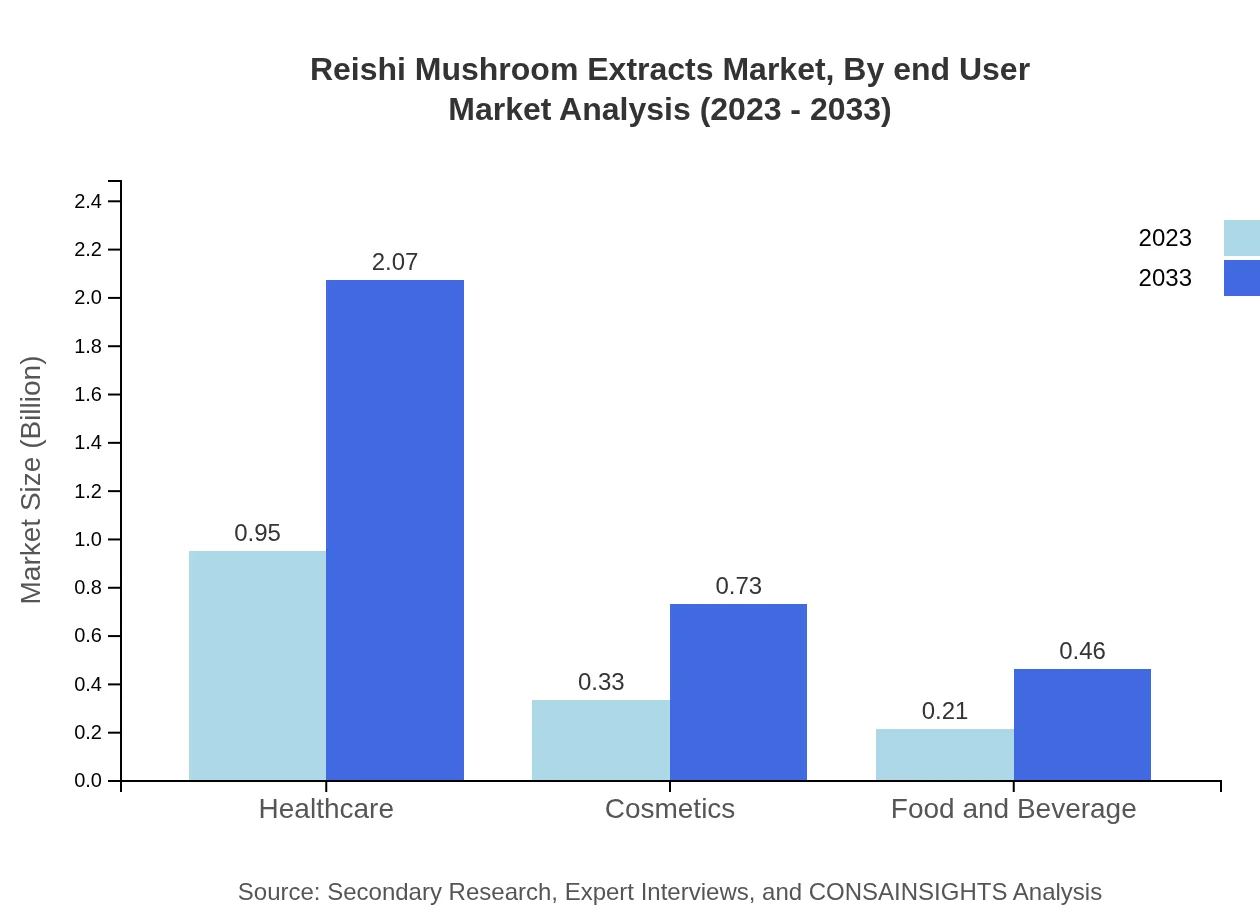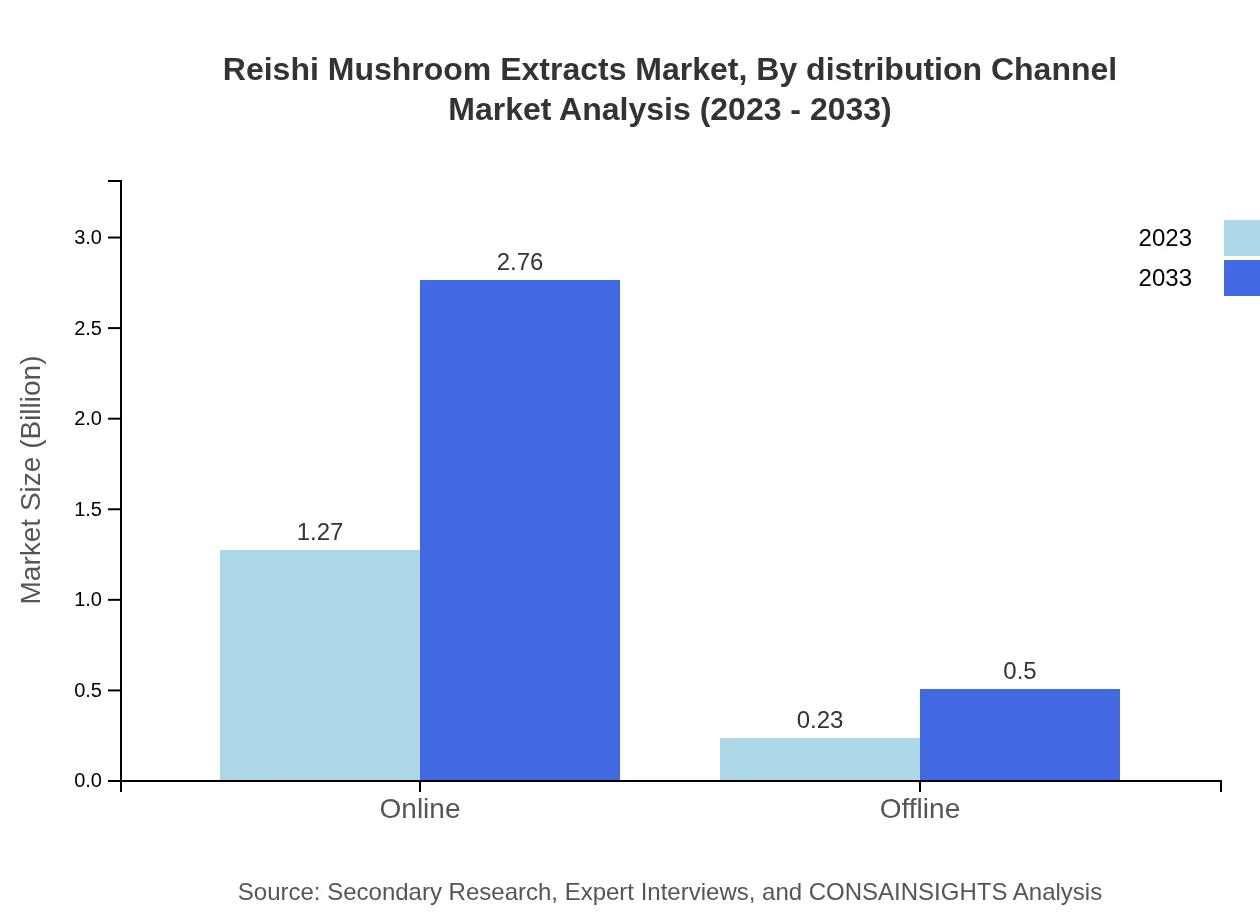Reishi Mushroom Extracts Market Report
Published Date: 31 January 2026 | Report Code: reishi-mushroom-extracts
Reishi Mushroom Extracts Market Size, Share, Industry Trends and Forecast to 2033
This report provides a comprehensive analysis of the Reishi Mushroom Extracts market, covering insights into market size, trends, segmentation, and forecasts from 2023 to 2033.
| Metric | Value |
|---|---|
| Study Period | 2023 - 2033 |
| 2023 Market Size | $1.50 Billion |
| CAGR (2023-2033) | 7.8% |
| 2033 Market Size | $3.25 Billion |
| Top Companies | Aloha Medicinals, Fungi Perfecti, Host Defense, Nammex, Swanson Health Products |
| Last Modified Date | 31 January 2026 |
Reishi Mushroom Extracts Market Overview
Customize Reishi Mushroom Extracts Market Report market research report
- ✔ Get in-depth analysis of Reishi Mushroom Extracts market size, growth, and forecasts.
- ✔ Understand Reishi Mushroom Extracts's regional dynamics and industry-specific trends.
- ✔ Identify potential applications, end-user demand, and growth segments in Reishi Mushroom Extracts
What is the Market Size & CAGR of Reishi Mushroom Extracts market in 2023 and 2033?
Reishi Mushroom Extracts Industry Analysis
Reishi Mushroom Extracts Market Segmentation and Scope
Tell us your focus area and get a customized research report.
Reishi Mushroom Extracts Market Analysis Report by Region
Europe Reishi Mushroom Extracts Market Report:
The European market is anticipated to grow from $0.47 billion in 2023 to $1.02 billion by 2033. Regulatory frameworks encouraging the use of herbal extracts in dietary supplements play a pivotal role in this region's expansion.Asia Pacific Reishi Mushroom Extracts Market Report:
The Asia Pacific region held a market value of $0.27 billion in 2023 and is expected to reach $0.58 billion by 2033, benefitting from traditional medicinal practices and increasing consumer interest in herbal products. Countries like China and Japan lead in production and usage, contributing significantly to regional growth.North America Reishi Mushroom Extracts Market Report:
North America represents a significant market for Reishi Mushroom Extracts, with a size of $0.57 billion in 2023 and expected to reach $1.23 billion by 2033. The dominant consumer demographic is health-conscious individuals seeking natural supplements to enhance their wellness.South America Reishi Mushroom Extracts Market Report:
In South America, the market was valued at $0.08 billion in 2023 and is projected to grow to $0.17 billion by 2033. The gradual adoption of health supplements and increasing disposable income among consumers are vital factors driving this growth.Middle East & Africa Reishi Mushroom Extracts Market Report:
The Middle East and Africa market, with a size of $0.11 billion in 2023 and projected growth to $0.24 billion by 2033, is witnessing increased interest in alternative medicine and herbal therapies alongside rising health awareness.Tell us your focus area and get a customized research report.
Reishi Mushroom Extracts Market Analysis By Product Type
In 2023, the Powder segment is valued at $0.95 billion, making up 63.54% of the market share. It is projected to grow to $2.07 billion by 2033. Likewise, Liquid Extracts account for $0.33 billion in 2023 and are expected to reach $0.73 billion in 2033. The Capsule segment lags with $0.21 billion in 2023, projected to grow to $0.46 billion by 2033.
Reishi Mushroom Extracts Market Analysis By Ingredient Functionality
In terms of functionality, Immune Support holds the largest market value at $0.88 billion (58.44% share) in 2023, anticipated to rise to $1.90 billion by 2033. The Anti-Stress market is valued at $0.34 billion, set to grow to $0.73 billion, while Anti-Inflammatory and Cardiovascular Support segments are smaller but still growing.
Reishi Mushroom Extracts Market Analysis By End User
The healthcare segment dominates the Reishi Mushroom Extracts market with a size of $0.95 billion in 2023 (63.54% share). Other segments include Cosmetics valued at $0.33 billion (22.31% share), and Food and Beverage at $0.21 billion (14.15%). The trend towards natural products supports the growth of these segments.
Reishi Mushroom Extracts Market Analysis By Distribution Channel
Online distribution channels lead with significant market share at $1.27 billion (84.76% share) in 2023, projected to reach $2.76 billion by 2033, while Offline channels are substantially smaller, with a market value of $0.23 billion in 2023 expected to grow to $0.50 billion.
Reishi Mushroom Extracts Market Trends and Future Forecast
Tell us your focus area and get a customized research report.
Global Market Leaders and Top Companies in Reishi Mushroom Extracts Industry
Aloha Medicinals:
A leading provider of high-quality mushroom-based products, Aloha Medicinals specializes in the cultivation and extraction of medicinal mushrooms, including Reishi. Their commitment to sustainable practices has positioned them well in the health supplement market.Fungi Perfecti:
Founded by mycologist Paul Stamets, Fungi Perfecti is renowned for its innovative fungal products, including Reishi mushroom extracts aimed at enhancing health and performance and promoting ecological sustainability.Host Defense:
A pioneer in mycology, Host Defense offers a range of Reishi-based products, focusing on the immune system and overall wellness; it leverages scientific research to support the benefits of medicinal mushrooms.Nammex:
A reputable supplier of mushroom extracts, Nammex focuses on organic and high-quality Reishi products, catering to the growing demand within the health and wellness sector.Swanson Health Products:
Swanson is known for accessible health supplements and natural products and has effectively incorporated Reishi into its product lineup to respond to market needs.We're grateful to work with incredible clients.









FAQs
What is the market size of reishi Mushroom Extracts?
The global market size for reishi mushroom extracts is projected to reach USD 1.5 billion by 2033, growing at a CAGR of 7.8% from 2023. This indicates a significant growth trajectory, reflecting increasing demand across various industries.
What are the key market players or companies in this reishi Mushroom Extracts industry?
Key market players in the reishi mushroom extracts industry include prominent herbal supplement producers, health food companies, and cosmetic manufacturers specializing in natural ingredients. Notable brands are actively enhancing their product lines to cater to the growing consumer interest in herbal benefits.
What are the primary factors driving the growth in the reishi Mushroom Extracts industry?
Key growth drivers include rising consumer awareness about health benefits, increasing adoption of reishi in dietary supplements, and the growing trend of natural and organic products in health and wellness sectors. Additionally, scientific research backing the benefits of reishi contributes to its popularity.
Which region is the fastest Growing in the reishi Mushroom Extracts?
The fastest-growing region for reishi mushroom extracts is North America, projected to grow from USD 0.57 billion in 2023 to USD 1.23 billion by 2033. This growth is supported by increasing awareness of health-related products and burgeoning demand for natural supplements.
Does ConsaInsights provide customized market report data for the reishi Mushroom Extracts industry?
Yes, ConsaInsights offers customized market report data tailored to meet specific client requirements within the reishi mushroom extracts industry. This ensures clients receive the most relevant and actionable insights for their strategic decisions.
What deliverables can I expect from this reishi Mushroom Extracts market research project?
Deliverables from the reishi mushroom extracts market research project include comprehensive market analysis reports, trend forecasts, competitor analysis, segment breakdowns, and regional insights, all designed to equip clients with informed decision-making tools.
What are the market trends of reishi Mushroom Extracts?
Market trends for reishi mushroom extracts reflect a shift towards holistic health solutions, with significant growth in the healthcare segment projected to expand from USD 0.95 billion in 2023 to USD 2.07 billion by 2033, driven by rising consumer preference for natural remedies.

